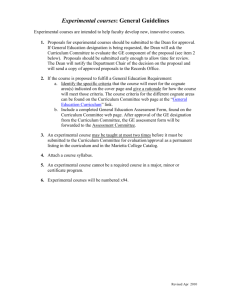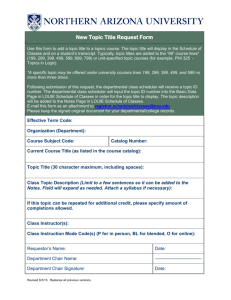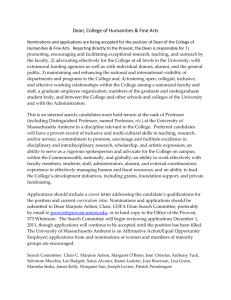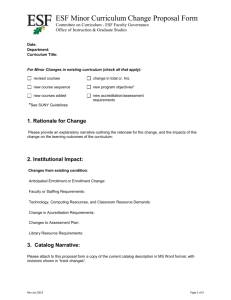Guidelines for Academic Program Review (Revised 7/18/11)
advertisement
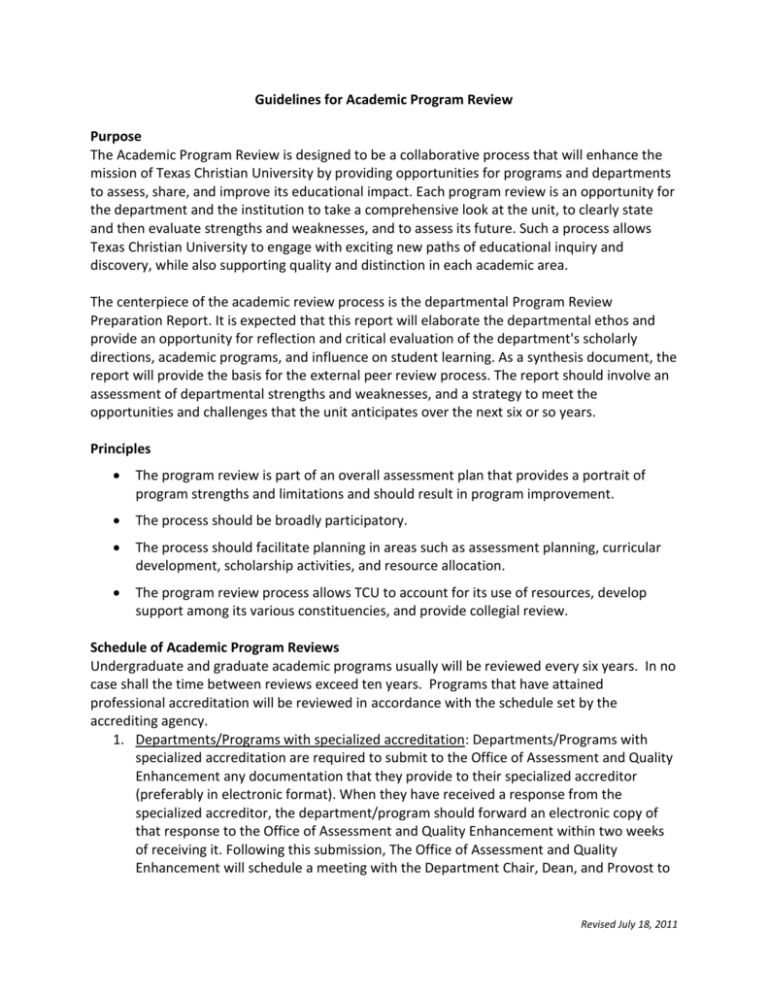
Guidelines for Academic Program Review Purpose The Academic Program Review is designed to be a collaborative process that will enhance the mission of Texas Christian University by providing opportunities for programs and departments to assess, share, and improve its educational impact. Each program review is an opportunity for the department and the institution to take a comprehensive look at the unit, to clearly state and then evaluate strengths and weaknesses, and to assess its future. Such a process allows Texas Christian University to engage with exciting new paths of educational inquiry and discovery, while also supporting quality and distinction in each academic area. The centerpiece of the academic review process is the departmental Program Review Preparation Report. It is expected that this report will elaborate the departmental ethos and provide an opportunity for reflection and critical evaluation of the department's scholarly directions, academic programs, and influence on student learning. As a synthesis document, the report will provide the basis for the external peer review process. The report should involve an assessment of departmental strengths and weaknesses, and a strategy to meet the opportunities and challenges that the unit anticipates over the next six or so years. Principles The program review is part of an overall assessment plan that provides a portrait of program strengths and limitations and should result in program improvement. The process should be broadly participatory. The process should facilitate planning in areas such as assessment planning, curricular development, scholarship activities, and resource allocation. The program review process allows TCU to account for its use of resources, develop support among its various constituencies, and provide collegial review. Schedule of Academic Program Reviews Undergraduate and graduate academic programs usually will be reviewed every six years. In no case shall the time between reviews exceed ten years. Programs that have attained professional accreditation will be reviewed in accordance with the schedule set by the accrediting agency. 1. Departments/Programs with specialized accreditation: Departments/Programs with specialized accreditation are required to submit to the Office of Assessment and Quality Enhancement any documentation that they provide to their specialized accreditor (preferably in electronic format). When they have received a response from the specialized accreditor, the department/program should forward an electronic copy of that response to the Office of Assessment and Quality Enhancement within two weeks of receiving it. Following this submission, The Office of Assessment and Quality Enhancement will schedule a meeting with the Department Chair, Dean, and Provost to Revised July 18, 2011 discuss the findings and any suggestions made by the specialized accreditation review team as outlined in Phase II (below). 2. Departments/Programs without specialized accreditation: Those departments who do not hold specialized accreditation will go through the external review process as defined below. External Review Process for Program Review Phase I Notification of Departments Scheduled for Academic Program Review – By April 1st of each academic year, the department chair and respective dean will be notified that they are scheduled for an Academic Program Review during the following academic year. Department chairs are encouraged, however, to check the OA&QE website to check on the Review Calendar (www.assessment.tcu/ProgramReviewCalendar.htm ). Establishment of Review Committee. The department chair shall, in consultation with the dean of the college, the departmental faculty, and the Office for Assessment and Quality Enhancement, determine an appropriate external review committee consisting of at least two academic professionals in the appropriate discipline. The Dean will communicate this information to the OA&QE by January 1st. The reasonable and approved costs for the visit will be paid for by the Provost’s Office. The Office for Assessment and Quality Enhancement and the members of the external review committee will agree to a schedule of events which will include: Timeline for receiving information from the department Schedule of on-campus visit (including meeting times with appropriate faculty and staff) Scheduled time for submission of the final report Departmental Report/Information While the review committee may request other information, the following are elements that should be prepared for the external evaluators 1. Brief History/Profile of the Academic Program Provide a brief overview of the history of the program including such things as changes in administrative organization; dates new degree programs were established; significant additions to the faculty; and major changes in program direction. Including catalog copy (including degree requirements) Revised July 18, 2011 2. Program Mission/Goals/Learning Outcomes/Assessment Results Current program assessment plan (or access to the WEAVE Online system), 3. Student Recruitment, Retention, and Placement Describe student recruitment, retention, graduation, and support practices, e.g., recruitment initiatives, financial aid, course advising, mentoring, career advisement and placement effort. Evaluate the effectiveness of these strategies noting areas for improvement. As appropriate and useful, discuss these activities for both undergraduate and graduate students. Summarize student quality indicators for your program, e.g., scores on standardized tests, grade point averages, retention, graduation and placement rates, and, if applicable, undergraduate institution. Most recent Student Profile (available from Institutional Research), and Table listing program graduates for past three years with placement/employment and current contact information. 4. 5. Faculty and Teaching/Research/Service Quality Note outstanding achievements/contributions, e.g., leadership in national professional/research organizations in the discipline, awards for outstanding teaching, scholarship and creative activity, external funding for individuals or groups, success in recruiting faculty and staff from underrepresented groups. Summarize the process for determining faculty salary and the criteria used for awarding merit pay. The department chair and dean should review salaries and be able to report that salaries are generally appropriate for the faculty in the unit. table of average and median salaries by rank. (when the number of faculty in rank is < 3 report salary data in the aggregate), Faculty professional statements (Tenured/tenure-track faculty must submit a one-page professional statement describing his/her research, teaching, and service activities (both institutional and community-based) in the program). Resources Revised July 18, 2011 Describe the physical areas for instruction and research. Include usual classrooms and a brief overview of laboratory, technological resources, and other equipment in teaching and research areas. Note strengths, limitations, and possible resolutions. Review the departmental budget in terms of history, constraints, immediate needs linked to goals, etc. 6. Summary and Future Plans Describe the vision for the program over the next five to ten years in terms of curriculum, quality/quantity of students, faculty productivity, etc. Describe any limiting factors not previously discussed that prevent, or will prevent, the program from fulfilling its mission and/or achieving its goals/learning outcomes. Describe how the program can overcome these limiting factors to fulfill the vision outlined above. Should additional resources become available, specify three to five priority actions for the next five years. Identify specific outcomes to be accomplished with the additional resources. Assuming existing resources, identify specific outcomes to be accomplished prior to the next program review. Review Process: Phase II Following the review of the external reviewers or the submission of a specialized accreditation report, the Provost, Dean, and Chair will meet to discuss the findings and recommendations of the report. A follow up letter will come from the Provost to the department chair and faculty identifying specific issues for discussion. The Provost will meet with the departmental faculty to continue the discussion and to ensure continued enhancement of the department based on the review. Revised July 18, 2011

